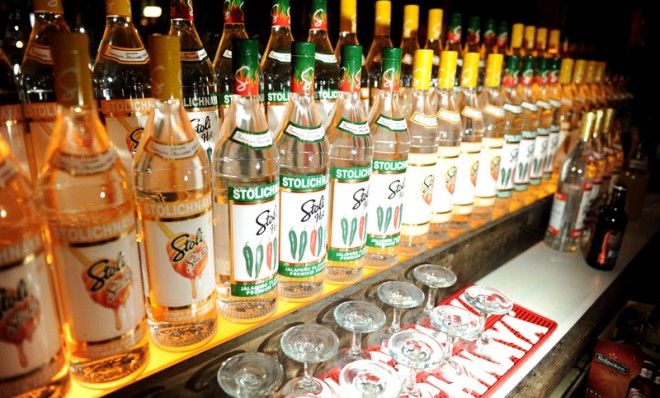Could a boycott of Russian vodka really help gay rights?
Dan Savage says dumping Stoli and other Russian brands would show solidarity


A free daily email with the biggest news stories of the day – and the best features from TheWeek.com
You are now subscribed
Your newsletter sign-up was successful
Russia's recent spate of laws banning "gay propaganda" and same-sex couple adoptions has some gay-rights supporters calling for a boycott of the 2014 Winter Olympics in the Russian seaside resort of Sochi.
There are a couple of reasons that's a bad idea, says Dan Savage at Seattle's The Stranger. First, as Patrick Burke, an activist for gay athletes, noted in reference to the 1968 Olympics in Mexico City — where medalists Tommie Smith and John Carlos made a stand for black civil rights by raising their fists — "history remembers the athletes who showed up." Also, "most of us weren't planning to go to the Olympic games in Russia this winter," says Savage, so a boycott would be useless.
Still, Olympic "boycott or no boycott there is something we can do right here, right now, in Seattle and other U.S. cities, to show our solidarity with Russian queers and their allies," Savage adds. "Dump Russian vodka." Particularly, Russia's two biggest-selling brands, Russian Standard and the iconic Stolichnaya.
The Week
Escape your echo chamber. Get the facts behind the news, plus analysis from multiple perspectives.

Sign up for The Week's Free Newsletters
From our morning news briefing to a weekly Good News Newsletter, get the best of The Week delivered directly to your inbox.
From our morning news briefing to a weekly Good News Newsletter, get the best of The Week delivered directly to your inbox.
Seattle's bars, gay and straight, must dump Stoli. Seattle's drinkers, gay and straight, must dump Stoli... If you drink a Russian vodka like Stoli, Russian Standard, or any of the other brands listed above, switch to another brand from another country, or even a local brand from a local distillery... Do not drink Russian vodka. Do not buy Russian vodka. Ask your bartender at your favorite bar — gay or otherwise — to DUMP STOLI and DUMP RUSSIAN VODKA. [The Stranger]
Savage is of course only one columnist in one city, but he has a pretty loud megaphone. (The "It Gets Better" campaign for LGBT youths? That's Savage.) At least two gay bars in Chicago have already either heeded Savage's call for a Russian vodka ban or came up with the idea on their own.
Art Johnston, owner of one of those bars, Sidetrack, says he isn't trying to foment a boycott.
"The purpose of this was not to say that we we're better than other businesses," Johnston tells the Windy City Times. "Other businesses have their own concerns and may not be in the same position to do something like this."
But even if every gay bar in America dumped Russian vodka, would it really make a difference?
A free daily email with the biggest news stories of the day – and the best features from TheWeek.com
The Small Business Development Center counts 45,000 bars and nightclubs in the U.S.
If all those 45,000 bars refused to serve Russian vodka until President Vladimir Putin eases up on gays and lesbians, that would probably get the attention of Russian vodka makers, if not the government. According to the Distilled Spirits Council of the United States, the U.S. imported 1,379,111 gallons of Russian vodka in 2012 — or roughly 6.9 million 750 ml bottles — worth $59.7 million.
But of course the U.S. isn't the only market for Russian vodka. Russian vodka makers, in fact, do quite a roaring business in Russia alone. A 2009 report showed that the average Russian drank 18 liters of pure alcohol a year, most of it vodka. "When you convert that into vodka bottles, it is simply mind-boggling," said then-Russian President Dimitri Medvedev at the time.
A modest boycott of Russian vodka in the U.S. won't bring Russian vodka brands, or the Russian government, to its knees. But most boycotts don't do that. They're a symbolic stand, usually by people who don't have many other ways to affect a situation — like, for example, American voters angry about Russian laws. If the boycott catches on, it will at the very least highlight the sometimes-violent crackdown on gays and lesbians in Russia and the curtailing of their rights.
And who will it hurt? Not vodka drinkers. Unlike whisky and rum and gin, the mark of a high-end vodka is its lack of flavor. If your local watering hole stops serving Stoli or Putinka or Moskovskaya, well, France and Sweden make some fine vodkas that will probably taste the same.
Peter has worked as a news and culture writer and editor at The Week since the site's launch in 2008. He covers politics, world affairs, religion and cultural currents. His journalism career began as a copy editor at a financial newswire and has included editorial positions at The New York Times Magazine, Facts on File, and Oregon State University.
